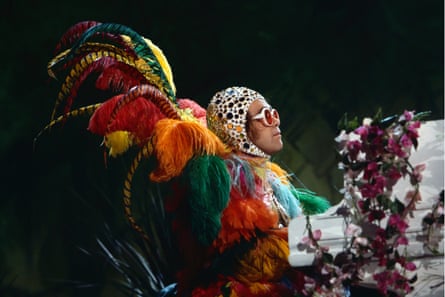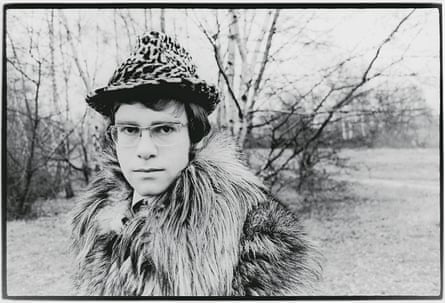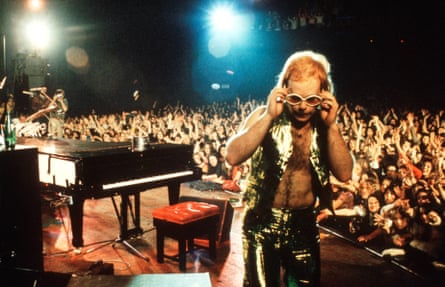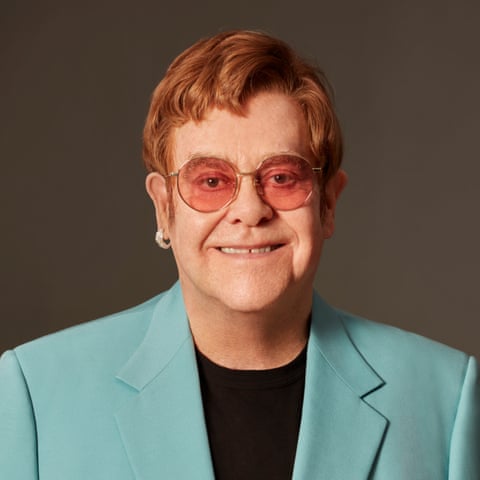A good illustration of Elton John in 2021 is how, last week, he scored the eighth UK No 1 single of his career and also had his right hip replaced. The 74-year-old certainly has his frailties – “my left hip is the hip of a two-year-old, and my right hip is the hip of a 92-year-old” – but is youthful in other ways. His enormously enjoyable and varied new album, The Lockdown Sessions, may feature a range of boomer-pleasing names, such as Eddie Vedder, Glen Campbell and two A-list Stevies (Wonder and Nicks), but there are also plenty of pop artists that could feasibly incite a TikTok dance craze: Dua Lipa, Lil Nas X, Rina Sawayama. One song pairs John with country singer Jimmie Allen over a drum’n’bass beat; another is interspersed with raps from Young Thug and Nicki Minaj.
“Watching Young Thug freestyle was just amazing!” he enthuses over a video call, self-isolating the day before his operation, dressed in collared, lapelled pyjamas over a rugby top. Oil paintings of 19th-century figures flank him in the background. “I hate it when people knock rap and hip-hop – when you actually go in the studio and watch Young Thug in front of a microphone, it’s an incredible thing.” He’d had dinner with Lipa, who duets with him on their No 1 single Cold Heart, a few nights before; he rings up Olly Alexander of Years & Years, who covered Pet Shop Boys’ It’s a Sin with him, “a couple of times a fortnight. I feel an empathy with these people. I’ve got the enthusiasm of an 18-year-old, and enthusiasm keeps me going.”
Even through a laptop screen, John has a buoyancy and a nose for fun. Holed up in Los Angeles when the pandemic began, he says it was lovely to spend time with his sons and husband, but his feet were clearly itchy: soon enough he was four doors down the road at the home studio of pop star Charlie Puth, and the following day he was on Zoom, adding vocals and piano to a track by Texas group Surfaces. “I went in the studio and wrote something with the Weeknd when I was there,” he reveals. “Whether he’ll release it or not, I don’t know, but it was fascinating to see the way he works. I write songs from start to finish, I’m old-fashioned; these people take bits of melodies and make a collage. Songwriting doesn’t have to be the same old form of songwriting.”

Even if he’s clearly thrilled to be in the charts again, this isn’t a cynical bid for relevance – he talks about new music with the zeal of a teenage stan trying to convince a doubtful parent. “Billie Eilish, at 15 she made a record, Lorde at 16 – I was still at school at 16. God knows how they do it. I’m in wonder, total awe, when I hear something different and new.”
After returning to London, an album started to emerge as he picked up more recording gigs: a track with Gorillaz, a strident Metallica cover with Miley Cyrus, piano and vocal harmonies for Lil Nas X recorded at Abbey Road. “I was in Studio Two, at the same desk with the stuffing coming out of it, and I thought: 54 years ago I was here with the Hollies doing He Ain’t Heavy, He’s My Brother. I’ve come full circle.”
That circle began when he was a session musician starting out at “the end of an era of songwriters, and the beginning of the singer-songwriter”. That’s him in the background of Daughter of Darkness by Tom Jones (“the camaraderie in those sessions, we just couldn’t sing for laughing”). At another Abbey Road session with comedy group the Barron Knights in 1968, also attended by Bernie Taupin, Paul McCartney walked in. That week, Hey Jude was at No 1. “This is the most famous person I’ve ever seen close up at this point in my life. Bernie and I were kind of stuck to the wall going oh … my … God! He sat down at the piano and played Hey Jude, a moment I will never forget in my entire life.”
Within five years, John was generating Beatlemania-level fandom of his own, powered by his fantastical, observational and baldly romantic songs with Taupin: Your Song, Tiny Dancer, Crocodile Rock and Goodbye Yellow Brick Road. The dorky, virginal naif Reg Dwight became the flamboyantly dressed pop star Elton John, finally understanding his sexuality once he was in a relationship with his manager, John Reid. They moved in together but John remained closeted to the public. “After a while, Bernie made the lyrics apply to a man or a woman, because I couldn’t get away with saying: ‘Darling, I love you, my angel’, or whatever,” he says. “I was living with my manager, I was always going to gay clubs, it was an open secret.”

He announced he was bisexual in a 1976 interview with Rolling Stone. “Some radio stations in America burned my records, but in general I got away with it. People appreciated honesty.” Did he confuse fans when he later married his female tape operator Renate Blauel, in 1984? He can’t say anything about the marriage – in 2019 she launched legal action against him after he discussed their relationship in his memoir Me, later settling with the promise that he would no longer discuss it – but he acknowledges that it did surprise some fans: “I got a lot of funny telegrams, put it like that.” In 1992, he said he was “quite comfortable about being gay”, and the following year met David Furnish. They had a civil partnership in 2005, on the day it became legal for same-sex couples, and then married in 2014, once that was legal too.
The half-closeted confusion of the 70s has evaporated in pop, and a number of the artists on The Lockdown Sessions, including Alexander, Sawayama and Brandi Carlile, are proudly LGBTQ; Lil Nas X recently danced naked in a prison shower for the operatically gay video to his single Industry Baby. “Outrageous, right? God almighty!” John laughs. “That didn’t happen in the 70s. God, we have a lot of work to do as far as equality goes, but it’s encouraging to see people like Perfume Genius and Troye Sivan writing songs about being gay. Things have changed – though if you live in Chechnya, Poland, Hungary, Russia, the Middle East, they’re not in the fortunate position we are.”
Another guest is Stevie Wonder, playing harmonica and singing on gospel song Finish Line. “I kind of played Ernie Wise to his Eric Morecambe,” John says. “My vocal is pretty straight, but there he is singing like [he does on] Superstition. I haven’t heard him sing like that for a long, long time, and that was magical, to hear him stretch out.” I remind him of a story he tells in Me, where in 1973 he grumpily boards the Starship, a converted Boeing 720 flying him around the US complete with organ. “Of course there was an organ on the plane!” he laughs. Unbeknown to him, Wonder had been brought on board to sing Happy Birthday to him, but John, in a funk after an unsatisfactory gig, repeatedly told his publicist to “fuck off” before she burst into tears and revealed the surprise.
John’s caustic side worsened when he started abusing cocaine and alcohol. Recalled in his memoir, this excess leads to some undeniably funny moments, such as trashing a hotel room after Simon Le Bon introduces him to the concept of the vodka martini, mistaking Bob Dylan for a dishevelled gardener at a house party (to the disapproval of George Harrison), or jamming on stage with the Rolling Stones for way longer than the one song he was invited for. There are some starker moral failures, too, such as when he brings one boyfriend out from Australia to live with him, gets bored and sends him back.
“I wasn’t unkind to anybody … I’m not horrible to people,” he protests. How does it feel to look back on moments like that Starship outburst? “I’m not proud of that stuff, no, it makes me shudder,” he says. “My behaviour was so erratic and so unpredictable. And it’s still in me, to explode at any moment. I’ve been trying to work on that for a long time and I’ve got a wonderful husband who knows how to get me out of that stuff. I think it’s an artistic thing – artists can be so self-destructive sometimes, for no reason. I can have a day when everything in my whole life is going so well, and I get up and I feel like the world is against me. Why, I do not know.”
When pressed, he says he does know. “The self-loathing, not having any self-esteem, that all comes from when I was a kid.” His memoir recalls his mother beating him with a wire brush during potty training; his father hit him for taking off his school blazer in a way he didn’t like. “That’s the way it was in the 50s – you got slapped round the face, you got a good hiding. ‘It was bloody good for you’ – it wasn’t good for me. It left me walking on eggshells.”
That feeling lasted into adulthood. “All my life, until I became sober, I was afraid of talking to anybody. They asked me when I went to treatment how I felt and I said: ‘I don’t know, I don’t feel anything.’ I came to defrost, as it were, and discovered I did have feelings, and they went back a long time. And I think it stays with you for the whole of your life … I just have terrible feelings about myself; I feel bad about myself sometimes.”

Still, he can use his self-knowledge to help his young musical peers. “Olly [Alexander] was down in the dumps recently, and I just said: Go out, have fun! Sit there alone, and that ball comes down like in Raiders of the Lost Ark: an avalanche of bad feeling.” It also, of course, informs the way he parents his sons Zachary, 10 and Elijah, who is eight.
“We never hit them or lose our temper with them,” he says. “When they’re bad, they lose their pocket money, or their electronic stuff for a week – but they don’t get punished physically or mentally. We talk it through with them. And they’re very happy children. I was always afraid of my parents, and I didn’t want my children to ever be afraid of me. They’re going to feel embraced and loved every second of the day; they’re not going to be beaten and have those scars for the rest of their lives. I thought I was too late to have children but actually they came at the right time in my life, and it’s taught me so much,” he adds, getting visibly emotional. “God, I love my children so much. I have a purpose in life.”
In 2022, he’ll restart his final world tour, Farewell Yellow Brick Road, postponed by Covid and his hip issues. “I want to finish it in the right way, and go out on a high note, but I also want to finish because I don’t want to do it again. I’ve been doing this since I was 17 – I’ve had enough applause. I’ll be 76 when the tour finishes – who knows how much [time] I’ve got left? It will be spent with the kids, and with David, smelling the roses.”
The waspishness of old occasionally emerges from the floral perfume though, for instance when we talk about Rocket Hour, his radio show for Apple Music. “I play a lot of music on my show that really should be played on Radio 1, but things are so formalised with their playlists, you get the same thing time and time again.” So Radio 1, and their commercial rivals, are too conservative? “So conservative! They overplay tracks – there are new things that need to be heard, and it’s holding people back … There shouldn’t be any rules, or barriers. If music is good, play it. And if it’s a new single by some terrible girl band or boy band, just drop it, will you?”

The radio show will keep on going after he finishes touring, an outlet for that voracious love of pop. Each week he has a list of releases sent to him by the record shop Rough Trade, and he buys anything he likes the look of, which sounds like nearly everything. Leeds post-punk band Yard Act are a recent fave. “It’s a bit like Craig Finn from the Hold Steady, who Sam Fender loves – it’s talking, it’s music, it’s really interesting, like Fontaines DC …” He’s also done a Christmas single with Ed Sheeran, whom John’s company Rocket managed early on his career.
“I’ve been able to give him advice and watch him grow, and he’s been so kind to me,” he says. “When [2011 Sheeran single] The A Team came out and a lot of US radio stations wouldn’t play it, I did a thing in the south of France, a private concert, free, for a certain radio chain to make sure they played it. When he was on at the Grammys, they weren’t going to put him on at the Grammys because they said he wasn’t going to be a star – I said to [show producer] Ken Ehrlich: ‘Suppose I played a duet with him, would that help?’ Yes – so I got him on the Grammys. He didn’t want to put [2014 single] Sing out, and I said: ‘You’ve got to put Sing out, you’ve put ballad after ballad out, and Sing will surprise everybody.’ And it did. He always thanks me for that.”
The stage musical of The Devil Wears Prada, which he wrote the music for, is coming in July 2022 after also being postponed by the pandemic, and there’s a cache of Taupin lyrics waiting for his music, “in a cupboard, or a safe, and when the time is right, I’ll get them out. I don’t know what’s going to come up – I didn’t know I was going to do The Lion King until Tim Rice phoned me up and it changed my life. If you let yourself be open to surprise, open your doors and say anything is possible, then you’ll have a wonderful life. And I have a wonderful life.”
The Lockdown Sessions is out now on EMI Universal
